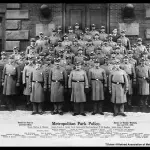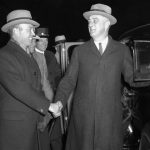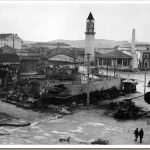 1872 – The first Metropolitan Police strike ever takes place in Great Britain. The Metropolitan Police strike was a refusal to work by 180 officers of the Metropolitan Police Divisions D, E, and T on November 16, 1872. It was a response to the dismissal of PC Goodchild and, demands for better pay and conditions. This action was important for setting a precedent for collective action by the police in order to improve working conditions.
1872 – The first Metropolitan Police strike ever takes place in Great Britain. The Metropolitan Police strike was a refusal to work by 180 officers of the Metropolitan Police Divisions D, E, and T on November 16, 1872. It was a response to the dismissal of PC Goodchild and, demands for better pay and conditions. This action was important for setting a precedent for collective action by the police in order to improve working conditions.
 1914 – The Federal Reserve is officially opened in the United States. A Federal Reserve Bank is a regional bank of the Federal Reserve System, on which the central banking system of the United States depends. There is a total of twelve banks, one for each of the twelve Federal Reserve Districts created by the Federal Reserve Act of 1913. Banks are jointly responsible for implementing the monetary policy set by the Federal Open Market Committee.
1914 – The Federal Reserve is officially opened in the United States. A Federal Reserve Bank is a regional bank of the Federal Reserve System, on which the central banking system of the United States depends. There is a total of twelve banks, one for each of the twelve Federal Reserve Districts created by the Federal Reserve Act of 1913. Banks are jointly responsible for implementing the monetary policy set by the Federal Open Market Committee.
 1933 – The United States and the Soviet Union establish diplomatic relations after a nearly 15-year break. Washington’s political, economic, and military relations with Moscow were severed in late 1917, when the October Revolution triumphed in Russia. The first Soviet ambassador to the United States would be Maxim Litvinov, while the American ambassador to the USSR would be William Bull. But despite these relationships, the two world superpowers for decades would be adversarial in both respects.
1933 – The United States and the Soviet Union establish diplomatic relations after a nearly 15-year break. Washington’s political, economic, and military relations with Moscow were severed in late 1917, when the October Revolution triumphed in Russia. The first Soviet ambassador to the United States would be Maxim Litvinov, while the American ambassador to the USSR would be William Bull. But despite these relationships, the two world superpowers for decades would be adversarial in both respects.
 1944 – November 17, 1944 was a happy day for all the citizens of Tirana. The fight for the liberation of Tirana was the largest operation of the operational-strategic scale developed by the UNÇSH for the liberation of the cities. The forces of the Brigades fighting in the capital continued their attacks for the annihilation of the besieged enemy and on the morning of November 16 launched the final attack for the liberation of Tirana. As a result, the forces of the 1st Brigade occupied the Officers’ House, the Clock, the Theater, etc. The forces of the VIII Brigade advanced on the road to Kavaja and met with the right wing of the I Brigade, further narrowing the ring of the enemy siege in the center of the capital.
1944 – November 17, 1944 was a happy day for all the citizens of Tirana. The fight for the liberation of Tirana was the largest operation of the operational-strategic scale developed by the UNÇSH for the liberation of the cities. The forces of the Brigades fighting in the capital continued their attacks for the annihilation of the besieged enemy and on the morning of November 16 launched the final attack for the liberation of Tirana. As a result, the forces of the 1st Brigade occupied the Officers’ House, the Clock, the Theater, etc. The forces of the VIII Brigade advanced on the road to Kavaja and met with the right wing of the I Brigade, further narrowing the ring of the enemy siege in the center of the capital.
 1945 – The United Nations Science, Culture, and Education Organization is established. Also known as UNESCO, this organization is based in Paris, France. Its stated purpose is to contribute to the promotion of international cooperation in education, science and culture. UNESCO has 193 member states and 11 associate members. Most of its field offices are “group” offices covering three or more locations. There are also national and regional offices. Albania has been a member of UNESCO since 1958.
1945 – The United Nations Science, Culture, and Education Organization is established. Also known as UNESCO, this organization is based in Paris, France. Its stated purpose is to contribute to the promotion of international cooperation in education, science and culture. UNESCO has 193 member states and 11 associate members. Most of its field offices are “group” offices covering three or more locations. There are also national and regional offices. Albania has been a member of UNESCO since 1958.
 1971 – Alexander Popov is born in Lesnoy. Popov, is a Russian swimmer. Widely regarded as the greatest sprint swimmer in history, Popov won the gold medal in the 50m and 100m freestyle at the 1992 Olympics. He repeated it at the 1996 Olympics, and is the only swimmer in history of the Olympics defending both titles. Popov, held the world record in the 50m for eight years, and the 100m for six. In 2003, at the age of 31, he won the 50m and 100m gold medals at the 2003 World Swimming Championships.
1971 – Alexander Popov is born in Lesnoy. Popov, is a Russian swimmer. Widely regarded as the greatest sprint swimmer in history, Popov won the gold medal in the 50m and 100m freestyle at the 1992 Olympics. He repeated it at the 1996 Olympics, and is the only swimmer in history of the Olympics defending both titles. Popov, held the world record in the 50m for eight years, and the 100m for six. In 2003, at the age of 31, he won the 50m and 100m gold medals at the 2003 World Swimming Championships.
 1973 – During the Skylab space program, NASA launches Skylab 4 with a crew of three astronauts from Cape Canaveral, Florida for an 85-day mission. The three astronauts on board, Gerald Carr, Edward Gobson, and William Pogue, worked in space in a time of 6060 hours. They carry out scientific experiments in the fields of medical activities, solar observations, Earth resources, observation of Comet Kohoutek and other experiments.
1973 – During the Skylab space program, NASA launches Skylab 4 with a crew of three astronauts from Cape Canaveral, Florida for an 85-day mission. The three astronauts on board, Gerald Carr, Edward Gobson, and William Pogue, worked in space in a time of 6060 hours. They carry out scientific experiments in the fields of medical activities, solar observations, Earth resources, observation of Comet Kohoutek and other experiments.
 1979 – The first metro line opens in Bucharest, Romania. It first opened for service on November 19, 1979. The network is operated by Metrorex. One of the two parts of Bucharest’s largest public transport network, Metrorex has an average of nearly 720,000 passenger trips per day, compared to 1,180,000 passengers daily in Bucharest’s STB transfer system. In total, the Metrorex system is 71.35 kilometers long and has 47 stations.
1979 – The first metro line opens in Bucharest, Romania. It first opened for service on November 19, 1979. The network is operated by Metrorex. One of the two parts of Bucharest’s largest public transport network, Metrorex has an average of nearly 720,000 passenger trips per day, compared to 1,180,000 passengers daily in Bucharest’s STB transfer system. In total, the Metrorex system is 71.35 kilometers long and has 47 stations.
 2006 – Milton Friedman dies in San Francisco at the age of 94. Friedman, was an American economist who received the Nobel Prize in 1976 in Economics. This award was given for his research on consumption analysis, monetary history and theory, and the complexity of stabilization policy. With George Stigler and others, Friedman was among the second-generation intellectual leaders of the Chicago School of Economics. Friedman’s challenges to what he later called “Keynesian naive theory” began with his re-interpretation in the 1950s of the function of consumption.
2006 – Milton Friedman dies in San Francisco at the age of 94. Friedman, was an American economist who received the Nobel Prize in 1976 in Economics. This award was given for his research on consumption analysis, monetary history and theory, and the complexity of stabilization policy. With George Stigler and others, Friedman was among the second-generation intellectual leaders of the Chicago School of Economics. Friedman’s challenges to what he later called “Keynesian naive theory” began with his re-interpretation in the 1950s of the function of consumption.






